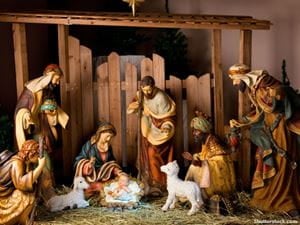
A few weeks ago, in the middle of Advent, I was talking with our CCD students about how God calls each of us to be a saint. During the course of our conversation, I asked the children: “What do you have to do to become a saint?” Their sincere and heartfelt responses included:
“Help Other People.”
“Love God with all your heart.”
“Pray a lot”
“Be Kind.”
"Listen to your parents."
Impressed with their replies, and satisfied that I had enough material to move the discussion forward, I discontinued taking answers. However, one little boy was undaunted and continued to fervently wave his hand. Not wanting to squelch his enthusiasm and afraid that he might, in the words of my grandmother, “burst his britches”, I decided to let him share his answer.
“Yes, Jimmy.” I said, “Is there something else we need to do to become a saint?”
“Yes! Yes!” he replied, “It’s the most important thing!”
“What is it Jimmy”
“Well, the most important thing you have to do to become a saint is that you have to die!”
The class and teachers chuckled kindly. I praised Jimmy for “technically” being correct and then moved on to talk about prayer, and kindness, and loving the Lord.
Later in the day, however, as I reflected on Jimmy’s response, “the most important thing you have to do to become a saint is that you have to die”, I began to realize that he was more than just technically correct. In fact, his words held both deep wisdom and a call to action for all of us as we celebrate the Christmas season.
During this season, we seldom hear any references to death. Indeed, Christmas is a time to celebrate birth; to celebrate the great hope that comes with new life. And yet, if we delve a little deeper into the Christmas story, we find death all around us. Not physical death per se, but death of self. Death of those mindsets and habits and fears that prevent us from encountering the living God who comes to us as a baby in a manger.
Consider our blessed mother, Mary. Mary dies to herself. She lets go of her doubts, worries, and ultimately her own will. “Behold, I am the handmaid of the Lord. May it be done to me according to your word.” And through that death, she gives birth to the Savior of the world!
Think about Joseph. Joseph dies to himself. Rather than divorcing Mary to save his reputation, he lets go of conventional wisdom and the social proprieties of his day, “he did as the angel of the Lord had commanded him and took his wife into his home.” And through that death, Mary is protected and the baby Jesus is provided for.
How about the shepherds? The shepherds die to themselves as well. They let go of their fears and their lowly social status. “When they saw this, they made known the message that had been told them about this child. All who heard it were amazed by what had been told them by the shepherds.” And through their death the Good News of Jesus’ birth is first spread throughout the land.
Then there are the three wise men. The Magi die to themselves. They let go of their power and riches and personal comfort to embark on a seemingly ludicrous journey; following a star to find a foreign baby in a foreign land. “They prostrated themselves and did him homage. Then they opened their treasures and offered him gifts of gold, frankincense, and myrrh. And having been warned in a dream not to return to Herod, they departed for their country by another way.” And through their death, they have a personal encounter with the Christ - a personal encounter that profoundly changes the course of their lives forever.
Each and every person we meet in the Nativity Story dies to themselves! Rather than holding on to their old way of life, they let go and embrace a new life in Christ!
Dying to ourselves is difficult. It was difficult for Mary. It was difficult for Joseph. It was difficult for the shepherds and the Magi. If we are honest with ourselves, we recognize that we usually put our own will first and foremost. Have no doubt, our intentions are usually good and noble and nice but too often they are tainted by self-interest. We tend to view the world through our political beliefs or our cultural prejudices or our personal hurts and wounds. And in doing so, we miss the opportunity to become saints.
The last line of the beautiful Peace Prayer of Saint Francis of Assisi reminds us that “it is in dying that we are born to eternal life.”
As we celebrate the birth of our Savior, let us pray for the grace to discern, accept, and carry out God’s will for our lives. Let us pray for the grace to “die”; to put aside fear, resentment, status, wealth and all those things in our lives that divert us from God; to open our hearts to God’s will in our lives!
This Christmas, God is calling each and every one of us to become saints. “Saint Jimmy” from CCD reminds us that “the most important thing we have to do to become a saint is to die!”

